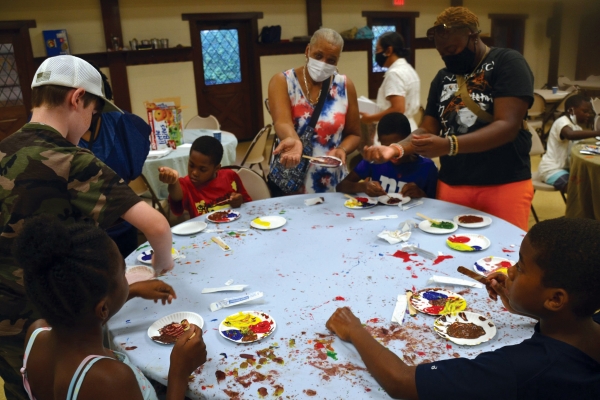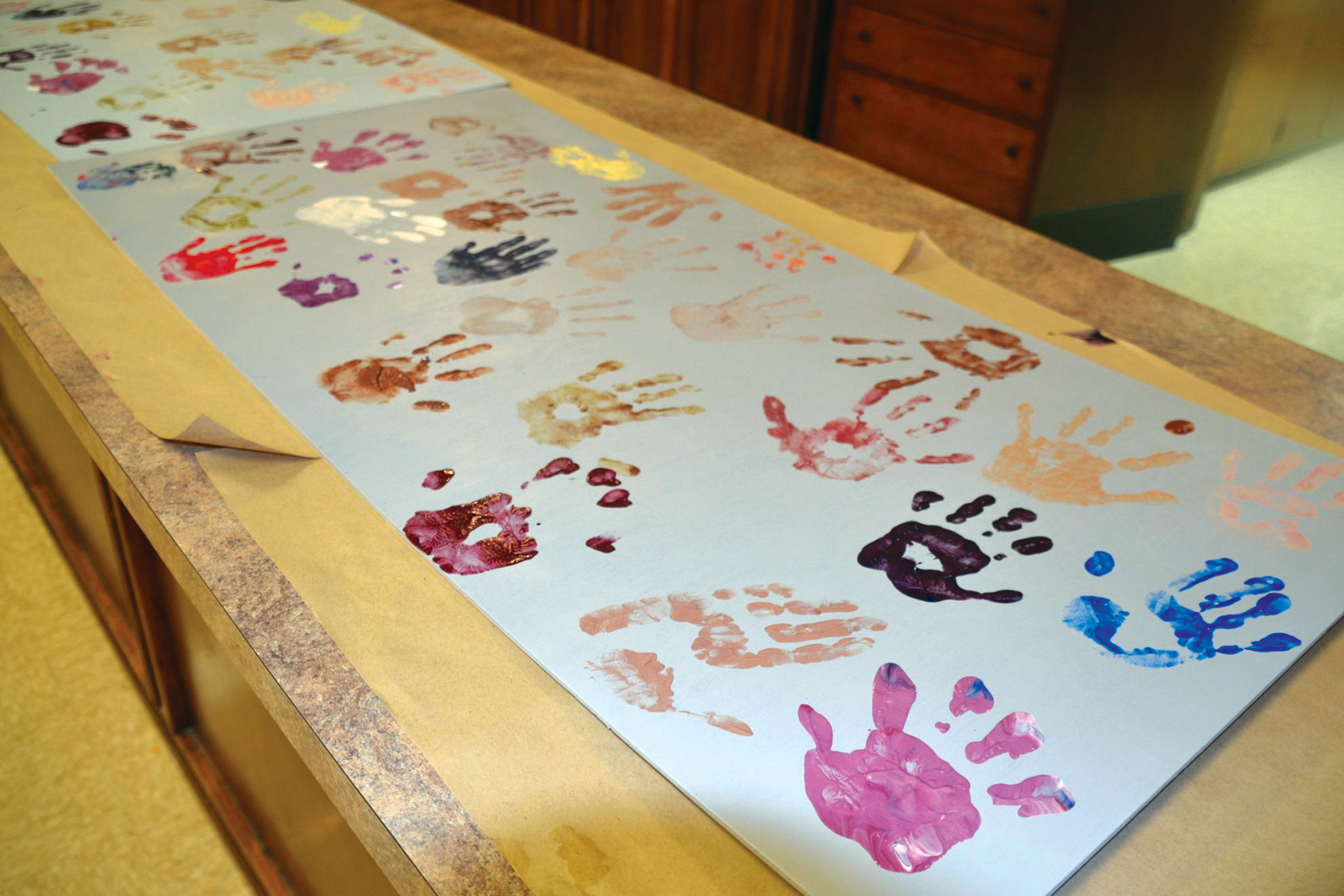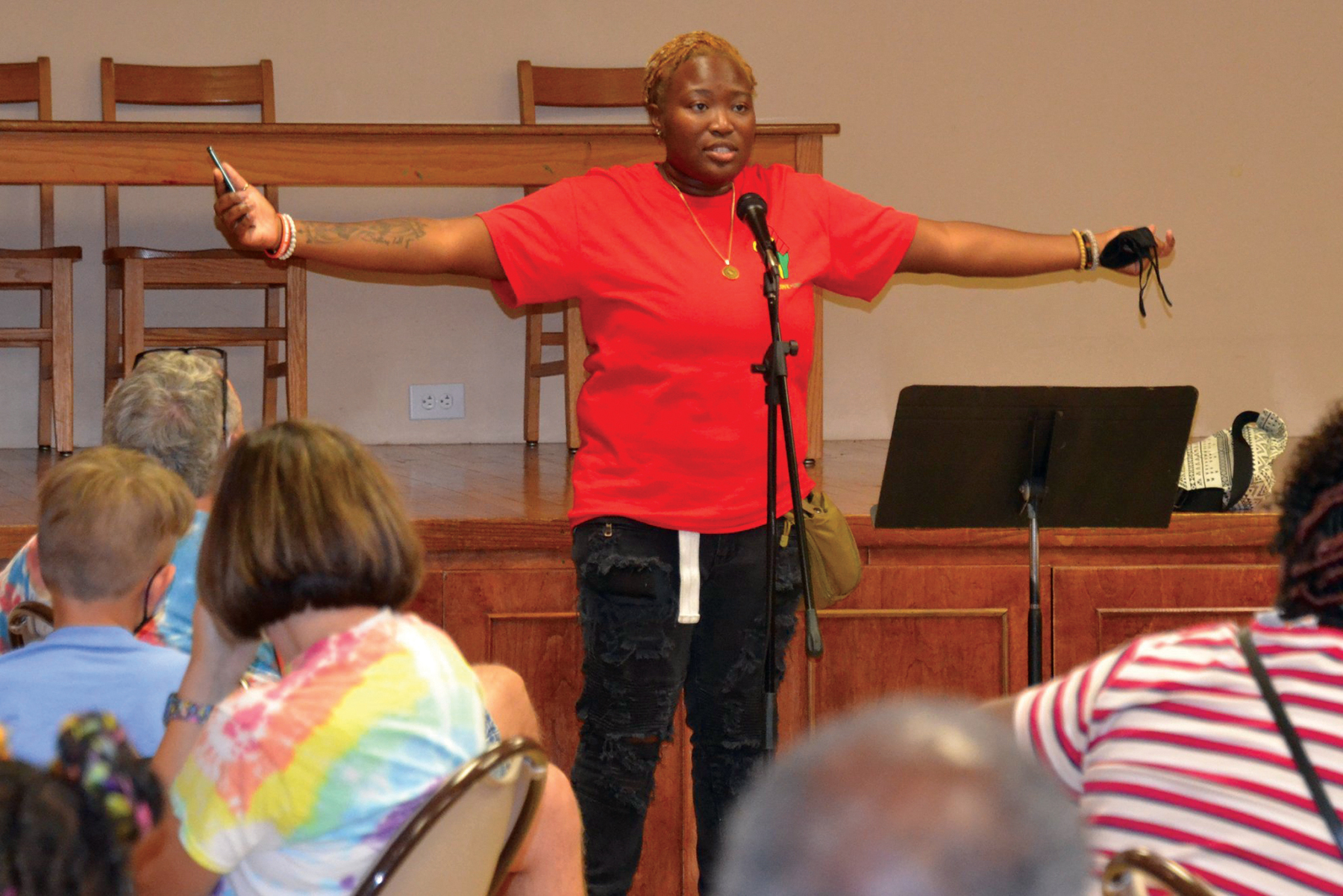Disciple: A Life-changing VBS

How Trinity, Statesville, cultivated new relationships to work toward racial justice
By Summerlee Walter
A group of children ranging in age from 3-years-old to late middle school were painting their arms. Blobs of red, blue and yellow finger paint dotted paper plates arrayed on circular tables in the parish hall of Trinity, Statesville, where children mixed the colors together to create shades of peach, tan and brown. The arm-painting wasn’t mess-making, just an enthusiastic interpretation of the activity: combining the three primary colors to replicate, as closely as possible, each child’s skin tone. They then used their custom mixes to paint self-portraits and add their handprints to collages, all the while learning that the enormously diverse range of skin tones present in the room and around the world all derive from the same three colors: red, yellow and blue.
[Image: Scenes from the multidenominational racial justice VBS cohosted by Trinity, Statesville, in the summer of 2022: participants combine paints to match their skin tones. Photos throughout by Jean Foster]
The skin tone activity was the Tuesday night craft during Made by God: Celebrating God’s Gloriously Diverse World, the multidenominational, racial justice-focused VBS hosted by Trinity during the summer of 2022. Based on a book of the same title by Dr. Tony Evans and using the parable of the Good Samaritan as its scriptural basis, the five-night gathering brought together four diverse churches to plan and host a truly collaborative, age-appropriate exploration of racism, diversity and racial justice. Both children and adults engaged with personal stories of experiencing racism while learning about the broader structures of systemic racism.
THE CHANGING FACE OF PARTNERSHIP
This was not the first time Trinity partnered with a historically Black church. In 1968, the congregation of Holy Cross, the Black Episcopal church in Statesville at the time, accepted Trinity’s invitation to merge the two congregations. This was not an equal partnership, however. The Holy Cross building was in disrepair, while Trinity was about to occupy an expanded new facility. Their shared priest, who negotiated between the two vestries, told the people of Holy Cross he would no longer be able to serve them after Trinity’s congregation took possession of the new building. Former members of Holy Cross participated fully in the life of Trinity, with congregants joining the choir and the vestry, but whether the people of Holy Cross joyfully accepted the invitation to join with Trinity or simply accepted what seemed inevitable is unknown.
“There’s some good history associated with that, and some bad history associated with that, but it is what it is, and so [interracial partnership] has been part of our journey all along,” Trinity parishioner Jean Foster explained.
In 2022, however, partnership looked different.

[Image: Participants combined paints to match their skin tones, resulting in a handprint banner.]
As a member of the vestry at Trinity, Foster started her term focusing on children and youth. In her second year, she asked rector the Rev. Brad Mullis if she could instead focus on the six areas that make up The Episcopal Church’s call to Becoming Beloved Community. To address the pillar of racial justice, Foster had the idea to host a VBS focused on anti-racism work in partnership with other churches, but she knew she did not have the expertise to plan the event alone. So she went looking for help.
Foster found the partner she needed at the local YMCA, where she approached then-City Council candidate Kim Wasson, a Black woman, to ask if she would be willing to lend her experience and insight to Foster’s vision. That was the first time they had spoken, but Wasson agreed to meet for coffee. And meet they did, for five hours, to plan VBS.
“I am not shy,” Foster offers by way of explanation. Presumably, Wasson’s willingness to help also had something to do with the humility with which Foster approaches racial justice work.
“I’m a white woman, and the last thing I want to do is to figure out what needs to be said on race coming from my background,” Foster said. Wasson, now a member of the Statesville City Council, took the lead on planning nightly themes and crafting the core of each lesson. She also invited her church, Shiloh AME Zion, to get involved. Another church joined based on a personal connection with another Trinity member. In total, four churches—Trinity, Shiloh AME, Lighthouse Deliverance and Grace Baptist—hosted nights, while other churches provided funds and volunteers.
“I was very excited when I heard about [the VBS],” said Kehla Ellis, a member of Shiloh AME Zion Church who helped to facilitate the middle school group. “It made me feel like there was a group of people who honestly wanted to hear from us and better involve themselves with making a lasting change. I didn’t want false validation; I wanted true, honest conversation to elevate the interaction within the community.”
Ellis informed part of that conversation by delivering one of the “Racism Moments” that happened during the large group presentation each night, sharing her own experience of racism as a Black person. “Each night a church shared a moment of transparency,” she explained. “It was a moment of voice instead of a moment of silence that opened up the possibility of involvement and relationship. Every activity was planned for the collective.”

[Image: Kehla Ellis shared a personal “Racism Moment.”]
Activities included very real conversations centered around the tenets of Becoming Beloved Community: the history of racism (Truth-telling), racial identity (Proclamation), how to begin healing from the effects of racism (Formation) and systemic racism’s effect on how people think about different neighborhoods (Justice). Each night’s small group activities allowed attendees to explore the theme in age-appropriate ways. For Truth-telling, the youngest group—3- and 4-year-olds—cut open M&M’s to see that, despite their different-colored candy shells, they are all the same on the inside. Older children played Gossip, passing whispered statements to each other to see how they change through time in order to illustrate how history distorts as it passes from generation to generation.
While the children broke into their small groups for hands-on activities, the adults who were not signed up as group leaders held impromptu conversations in the parish hall about experiences of racism in their own lives, sharing ideas, asking questions and having real, deep conversations about racism.
“It was life-changing for me,” Foster said.
BECOMING
The work continues. Foster is creating a Lenten program to regather the adults who came together during VBS to continue and broaden the conversations around race and racism they started during the summer. She is also in conversation about combining their respective youth groups on a recurring basis with two of the three partner churches and an additional church that wanted to participate in VBS but could not.
Foster is mindful these deepening relationships would not exist without an initial step of faith, both for white people conscious of the harm their own white privilege has caused and Black people who have been harmed by individual and systemic racism.
“Say a prayer about it, and just do it,” she said. “None of this gets better unless we talk about it.” Foster also has some advice for predominantly white churches interested in getting started with anti-racism work or partnering with a predominantly Black church.
“We need to ask the question, ‘What can we do?’ and then listen to the answer. We don’t need to determine what needs to be done.”
Summerlee Walter is the communications coordinator for the Diocese of North Carolina.
Tags: North Carolina Disciple / Racial Reckoning, Justice & Healing
